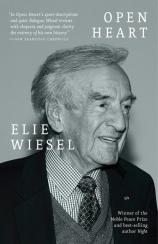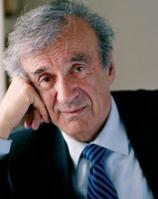Open Heart
Review
Open Heart
The year 2011 was a painful and frightening one for 82-year-old Elie Wiesel. A bout of double pneumonia in January was only the beginning of his medical problems that year. As he describes it in this memoir, more accurately an extended essay, in June he was wheeled into an operating room at Lenox Hill Hospital for emergency quintuple bypass surgery. But unlike the ordinary patient, Wiesel takes advantage of his near-death experience to reflect in these pages on the accomplishments that have brought his life significance and the unfinished tasks that, even in his ninth decade, spur him to continued passionate engagement with the world.
The title of the book serves double duty --- as a description of Wiesel’s medical procedure and as a shorthand description of his lifelong temperamental disposition. He experiences all the emotions of anyone who has ever been faced with a life-threatening medical crisis: “But now the words ‘open-heart surgery’ are meant for me. And they fill me with dread.” OPEN HEART, however, is more a philosophical meditation than a medical memoir. Wiesel has devoted much of his life to preserving the memory of his family and other victims of the Holocaust --- what he refers to as “the Event.” Here, he ponders how his experiences surviving the concentration camps have prepared him to face the prospect of his own death, even one that may involve something as prosaic as failing to awake from surgery in a New York City hospital. “Hadn’t I lived with death, even in death?” he asks. “Why should I be afraid now?”
"While one hopes OPEN HEART is not the final work Elie Wiesel produces, if that sadly turns out to be the case, it will serve as a concise, elegant summing up of an extraordinary life and career."
Confronting his mortality, there’s a certain poignancy when a man of Wiesel’s extraordinary and achievements --- some 50 books, a Nobel Peace Prize and universal admiration among them --- acknowledges that “I feel that I have not even begun” and that “in no way did I feel ready.” Deeply characteristic of his devotion to his calling is the fact that, despite his doctor’s urgings, he stops at his office for two hours to attend to paperwork, cancel appointments and meet with a group of Iranian dissidents before checking into the hospital for his surgery. Instead of accepting the possibility that he may die, he offers a laundry list of reasons to explain why he longs to recover to do even more: “So many things still to be achieved. So many projects to be completed. So many challenges yet to face. So many prayers yet to compose, so many words yet to discover, so many courses yet to give, so many lessons yet to receive.”
Apart from descriptions like these of his worldly tasks, Wiesel reflects, in passing, on theological matters. While he confesses “to having rebelled against the Lord,” he is quick to add, “I have never repudiated him.” In that sense, his worldview is a fundamentally optimistic one: “I belong to a generation that has often felt abandoned by God and betrayed by mankind. And yet, I believe that we must not give up on either.” Wiesel offers this summing up of the personal credo he says “defines my path”:
“We must choose between the violence of adults and the smiles of children, between the ugliness of hate and the will to oppose it. Between inflicting suffering and humiliation on our fellow man and offering him the solidarity and hope he deserves. Or not.”
As the book ends, Wiesel has emerged from his medical ordeal, spared, for now, from death or serious disability. Still, he recognizes the toll that’s been exacted and understands the combination of advancing aged and diminished physical capacities that will make it impossible, despite his will to do so, for him to carry on with the same level of energy that has marked his long, active life. Without any hint of resignation, he nonetheless accepts these facts with characteristic grace. “My life? I go on breathing from minute to minute, from prayer to prayer,” he concludes movingly.
This slim book --- barely 80 pages --- can be consumed in an hour or two. But that brevity shouldn’t be confused with a lack of substance. While one hopes OPEN HEART is not the final work Elie Wiesel produces, if that sadly turns out to be the case, it will serve as a concise, elegant summing up of an extraordinary life and career.
Reviewed by Harvey Freedenberg on January 18, 2013
Open Heart
- Publication Date: September 29, 2015
- Genres: Nonfiction
- Paperback: 96 pages
- Publisher: Schocken
- ISBN-10: 0805212582
- ISBN-13: 9780805212587





